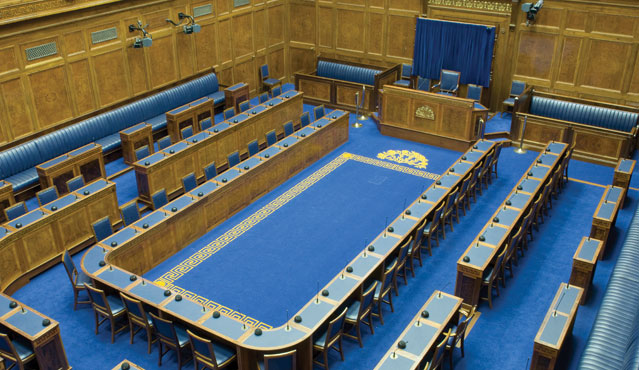Justice: A legislative programme

With less than a year left of the current Assembly mandate, the progression of legislation by the Department of Justice has required prioritisation. agendaNi outlines the justice legislation already brought forward to the Assembly by the Minister and the bills that could potentially come forward before the rising of the house in April 2022.
While many of the bills passing through the Northern Ireland Assembly in 2020 and 2021 were in direct response to or heavily influenced by the pandemic, Justice Minister Naomi Long MLA has been successful in progressing a number of significant non-pandemic pieces of legislation to date.
However, with the next Northern Ireland Assembly election set for 5 May 2022, the progress of any legislation not already introduced to the Assembly looks highly unlikely. Any outstanding potential legislation will not only have to wait until the next mandate but also need to be considered by the next Justice Minister.
At the end of January 2020, the Department of Justice stated that its legislative programme for the current mandate “is already full”, some 14 months before it ends.
Of those currently on the Assembly’s books, the Domestic Abuse and Civil Proceedings Bill is the most advanced and received royal assent on 1 March 2020. The Bill, which will make coercive control an offence in Northern Ireland for the first time and is designed to give victims more confidence to come forward, was a priority of the previous Justice Minister Claire Sugden MLA upon taking office in 2016 but the collapse of the Northern Ireland Assembly prevented the Bill progressing onto statute.
In the absence of a Northern Ireland Assembly, Westminster confirmed its intention to extend UK legislation to ensure that coercive control was to become a criminal offence in Northern Ireland, but the Bill fell when Parliament was dissolved in December 2019. A re-introduction of the Bill in March 2020 has now seen the Bill finalised.
Minister Long introduced the new Domestic Abuse and Family Proceedings Bill in March 2020. The Bill includes the creation of a new domestic abuse offence, two child aggravators associated with that offence, a statutory aggravation of domestic abuse associated with any other offence, and a number of associated changes to criminal procedures, evidence and sentencing in domestic abuse related cases.
The Bill passed the further consideration stage on 15 December 2020 and was expected to pass the final stage before the end of the year but an amendment which confers a discretionary power on the Legal Services Agency to waive the financial eligibility test in private family law cases in circumstances where the applicant has been the victim of a domestic abuse offence saw the Justice Minister raise concerns about the financial implications on the legal aid system.
The legislation finished the final stage on 18 January and has now received royal assent, with ambitions to bring the offence into operation before the end of 2021.
The second most advanced piece of legislation brought forward by the Minister is that of the Criminal Justice (Committal Reform) Bill. A key commitment of the New Decade, New Approach agreement signed by all Executive parties at the return of the Northern Ireland Executive in January 2020 was for the delivery of committal reform to help speed up the criminal justice system. It follows a series of recommendations by the Fresh Start Panel, the Gillen review and the Northern Ireland Audit Office on the need for committal process reform.
The Bill includes provisions to remove the need to call victims and witnesses to give oral evidence pretrial. It also makes amendments to the Justice Act (NI) 2015 in relation to technical out workings of direct committal including broadening offences to be included from murder/manslaughter to all offences triable only on indictment.
Having been introduced by the Minister on 3 November 2020, the Bill passed its second stage on 16 November and will soon be scrutinised at committee stage.
Introduced at the same time that the Domestic Abuse and Civil Proceedings Bill was proceeding through its final stage, the Protection from Stalking Bill is the third piece of significant justice-related legislation introduced to the Northern Ireland Assembly by the Minister. With its committee stage set to be scheduled following its introduction on 18 January, the Bill will likely face a race against time to clear all stages before the conclusion of the mandate.
The legislation aims to make stalking a specific offence in Northern Ireland, bringing it in line with the rest of the UK. The 20-clause Bill also includes provision for the introduction of Stalking Protection Orders to Northern Ireland.
The Damages (Return on Investment) Bill is the latest Bill to be brought to the Assembly by the Minister. Introduced on 1 March 2021, the Bill, which is seeking to change the existing personal discount rate (PIDR) and introduce a new legal framework for setting the discount rate, completed its second stage eight days later.
Initially, it was presumed that the Department would seek accelerated passage for the Bill (meaning that it would skip committee stage and potentially see the Bill introduced within 10 days), but that has not been the case.
The final potential Bill is a Justice (Miscellaneous Provisions) Bill, targeted for spring 2021. The Minister has said that this would legislate for “a number of discrete policy areas that do not come within scope of the other Bills in the mandate”.
Such a Bill may include, but not be limited to, consideration of a number of consultations recently launched or concluded by the Department, including:
- Domestic Abuse Protection Notices and Orders (closed 12 February): The consultation provides an opportunity to inform the development of proposals for legislation. It is intended to bring forward primary legislation to implement provisions around Domestic Abuse Protection Notices and Orders; and
- Consultation on the use of “consent to serious harm for sexual gratification” as a defence (closed 11 January): The Department will take steps to implement any recommendations which are accepted. If it is concluded that new legislation is required, its timing will be dependent upon fitting it into the Northern Ireland Assembly’s legislative timetable.
The Minister has outlined her belief that Introduction of the Justice Bill in early 2021 will ensure that the Bill can complete its Assembly scrutiny and passage before the House rises in March 2022 for the next local elections, however it has yet to be brought forward.
Definite legislation
- Domestic Abuse and Family Proceedings Bill
Introduced: 31 March 2020 Final stage, 18 January 2021 Awaiting Royal Assent - Criminal Justice (Committal Reform) Bill
Introduced: 3 November 2020 Current stage: Committee stage, to be scheduled - Protection from Stalking Bill
Introduced: 18 January 2021 Current stage: Committee stage, to be scheduled - The Damages (Return on Investment) Bill
Current stage: Committee stage, to be scheduled 1 March
Potential legislation
- Justice (Miscellaneous Provisions) Bill
Introduced: Estimated for spring 2021





